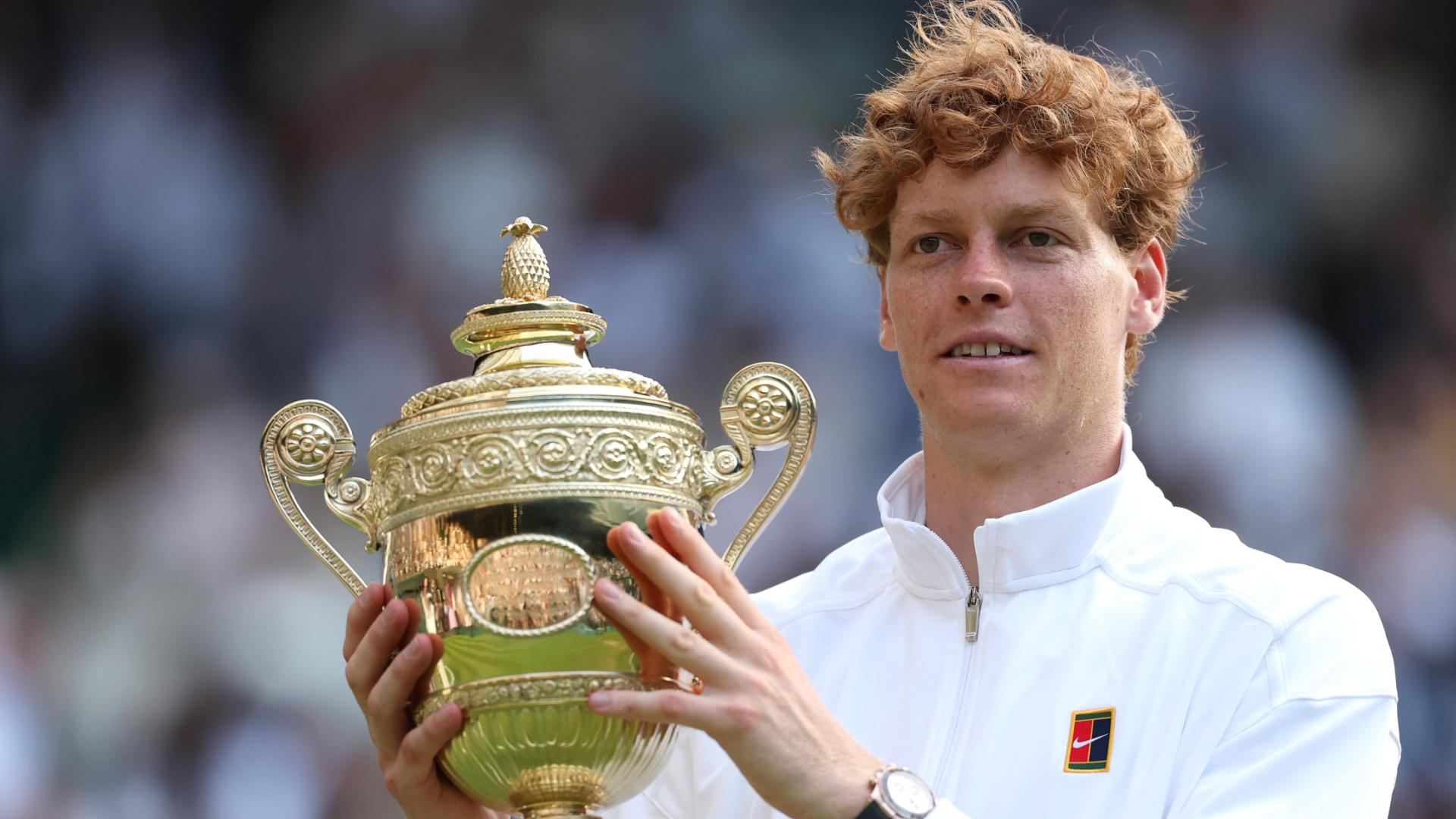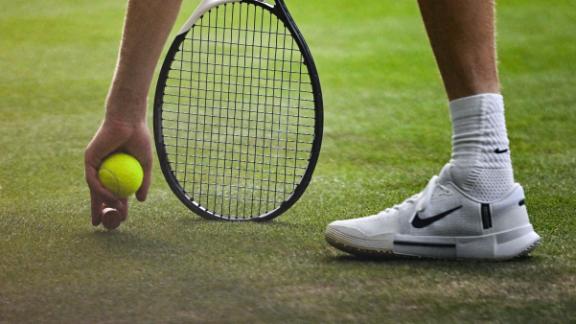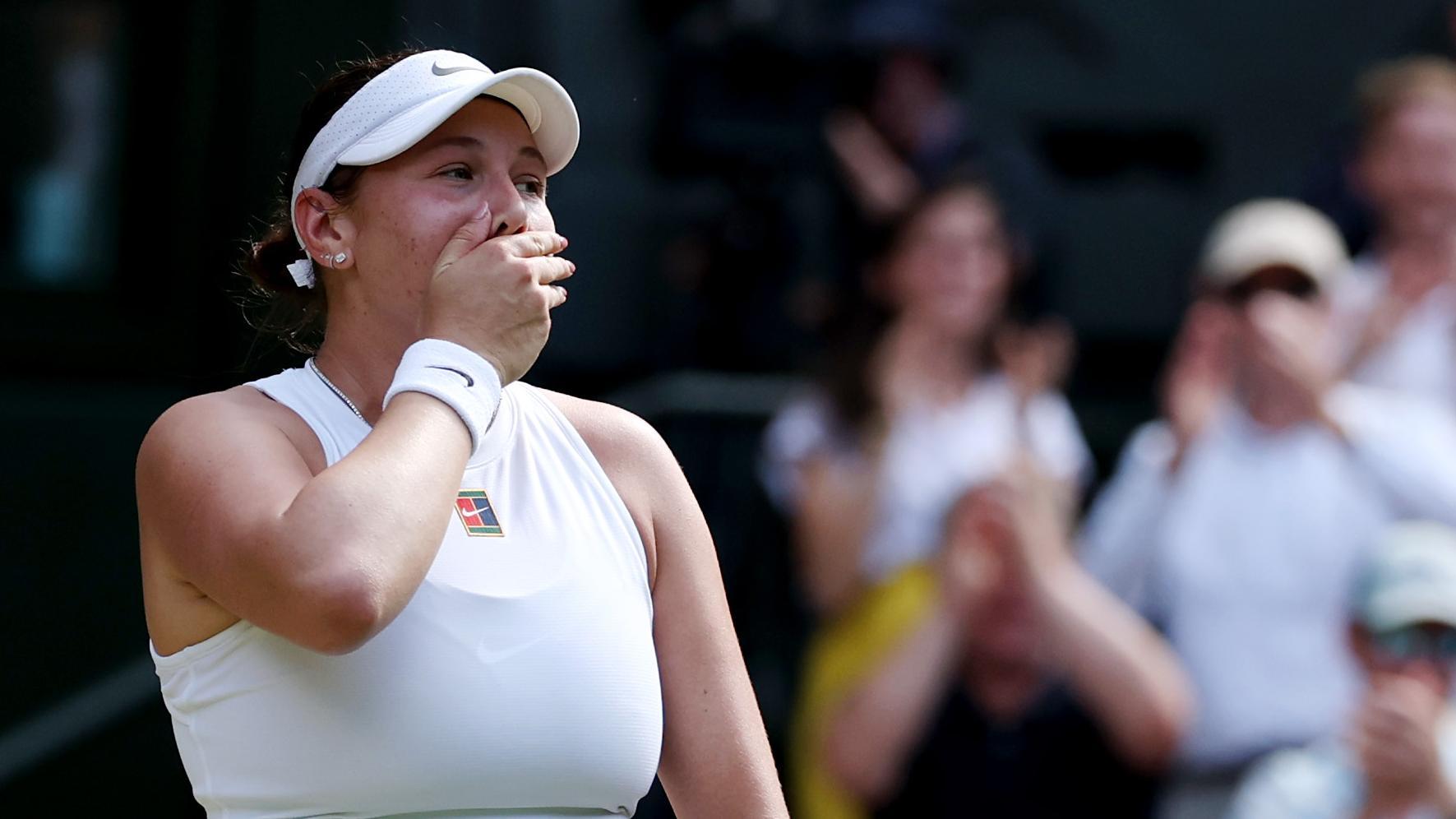Unvarnished Connors back in spotlight
For 20 years, Jimmy Connors was one of tennis' most provocative public figures. And then, after retiring at the end of the 1992 season, he almost vanished. He kept a low profile in Santa Barbara, Calif., going to great lengths to avoid the very sport that had made him so famous and so fascinating.
Fourteen years later, Connors came in from the cold. He accepted a commentary job from the BBC at Wimbledon. A year later, in 2006, he signed on to coach Andy Roddick for what turned out to be 18 months. More recently, he has been a sometime analyst for Tennis Channel.
Now, after the publishing of his memoir "The Outsider," Connors is back in the tennis life full throttle. For the last week or so, he's been everywhere. On Monday, he was in Bristol, Conn., for ESPN's celebrated "car wash," a super-concentrated, multi-platform spin through the Worldwide Leader's various venues. It started with an appearance on "Mike & Mike in the Morning" and included visits with "Outside the Lines," ESPN Radio, ESPN Deportes and a newsmaker luncheon for employees. It ended five hours later with an interview by Chris McKendry concerning his history at the U.S. Open.
Somewhere in there, the eight-time Grand Slam singles champion sat down for a few minutes with ESPN.com in a conference room on the main campus. Considering the aggressive book campaign he has been waging, Connors seemed fresh, amiable and relaxed. His blue eyes, even behind formidable tortoise-shell glasses, still crackle with energy, and his slightly graying hair is still shaggy and swept back, reminiscent of his 1970s style. Dressed in a blue blazer and gray slacks, he could have been a college physics professor -- not one of the most combustible players tennis has ever known.
For this second act, perhaps we should call him James Connors.
What did he learn from his self-imposed exile from tennis?
"I learned," said Connors, laughing, "that I stayed away a little too long."
And then he laughed some more. Years ago, he said, Bobby Riggs -- who lost the celebrated Battle of the Sexes match to Billie Jean King 40 years ago this past Monday in 1973 -- told him, "You'll look back and it will be almost like you never played."
In retrospect, Connors said, Riggs was right.
"I had amnesia for a long time," Connors said. "To go back and write the book -- tension is what made it fun. If it was just a flat line going through and playing, no controversy or excitement or emotion, I could have figured out something else to do, for sure."
So why come back now?
"I retired a little early," he said, smiling. "It was necessary, so I got away from the tennis. I'm 60, and I'm back. I only have so much time to spend running around and doing things.
"It's been hectic, but it's been good. Getting back to work, sometimes you have to get into the flow. I was thrown into it, so it was a quick education. I'm settling in and feeling a lot more comfortable."
Connors began to sound his age when he talked about the open friendships among today's top players.
"The game now is what it is," he said. "I've been criticized for saying it, but the rivalries are soft. I can only compare it to what I did. To me, they were real, not only on the court but off the court, too. I don't see Mac [John McEnroe] coming up and putting his arm around me and consoling me.
"Maybe it's because tennis has become such big business, that they're all making their fair share. Back in my day, it was all about the winning. But now, sometimes there are guys who get their success at the end of the year by the size of their bank account, as opposed to the number of titles that they win."
Connors won a record 109 ATP World Tour singles titles; his career won-loss percentage of 81.77 is the second-best ever, after Bjorn Borg. Connors won six U.S. Opens from 1974-83, but he says he treasures his run to the semifinals in 1991, at the age of 39, above any of those titles.
"I don't hesitate, because that's what I was really hoping for in tennis," Connors said. "Twenty thousand people sounded like sixty [thousand]. The noise was incredible. And that's what tennis was fighting for from the very beginning -- to try to be hockey or baseball or football or basketball -- to get that kind of reaction."
Does he see any of today's players hanging on for that long?
"It's not that they couldn't, it's will they?" Connors said. "So many good things happen to them over the course of a short career, I wonder if they would want to put that kind of effort in without looking over and saying, 'I'm comfortable enough, I've done enough. Do I love it enough?'
"That's really the key to it. If you love it enough, the pain don't hurt."
Jimmy Connors won't go quietly
NEW YORK -- He was tennis' most scatalogical champ and the King of the Five-Set Comeback. He's known for boasting he was loved for it all because "I spilled my blood and guts out there." And there's no disputing that. The real tension in the question "Who is Jimmy Connors?" -- the first vulgarian to crash tennis' gates back in the 1970s, or just another compulsively driven sports great who believed all's fair in competition? -- should be settled with the publication of his autobiography, at long last, at the age of 60. Even its title, "The Outsider," gives away the answer.
Connors is exactly who we thought he was.
His book is a more detailed explanation. But he is not seeking exoneration.
So pay no attention to the window dressing on this slight man who's been making the talk-show and interview rounds the past week in an understated suit jacket, crisp white shirt and Clark Kent glasses. It only confuses the issue. Connors' look and carriage off the court never matched his grenade-tossing tennis antics on it, or his bad-boy view on things like a 21-day suspension he writes about receiving once for crude behavior: "You mean you can't grab your nuts? I didn't get that memo."
Excerpt: Jimmy Connors -- 'The Outsider'
Chapter 7: Love Game
A week before the Queen's Club tournament in June 1972, I attended an official dinner to celebrate the US team's victory in the Wightman Cup. They had defeated the British 5-2 in a contest played that year at Wimbledon. One of the US team members was Wendy Overton, a friend of mine and a top-10 doubles player, who needed a date for the dinner and asked if I could go.
I probably wasn't very good company for Wendy that evening, though, because all through the meal I couldn't take my eyes off cute, young Chris Evert across the way. I knew who she was -- Mom and I had caught a ride to Coral Gables with Chris and her parents back in 1965 -- and I wanted to get to know her better. I would glance over at her table and see her smiling at me, or I would try and catch her eye when she was in mid-conversation with the Wightman Cup team coach, Bill Graves.
When dinner was finished, I walked over and introduced myself. It was a nice opening to take the conversation to another level. I was always told that you should always leave a party with the girl you came with, so at the end of the festivities, I made sure to take Wendy back to her hotel. It didn't take me long, though, to find out just what room Chrissie was staying in.
For the first time that year, the Queen's Club was also hosting the ladies' Rothmans grass-court championship, which was the warm-up tournament for Wimbledon, so it wasn't hard to make sure I ran into Chrissie again. The dining-room area of the club was small, and one day when Chrissie was sitting there before one of her matches, I pulled up a chair next to her at lunch and turned on the charm faucet! I wasn't looking for a steady girlfriend. But I thought we could have some fun together.
On The Move
Who's Hot

Victoria Azarenka: 18-1 (.947) Rafael Nadal: 31-2 (.939) Serena Williams: 31-2 (.939) Novak Djokovic: 26-3 (.897) Maria Sharapova: 28-4 (.875) Andy Murray: 22-4 (.846)
Who's Not
Dominika Cibulkova: 10-11 (.476) Julia Goerges: 11-11 (.500) Juan Monaco: 10-10 (.500) Marion Bartoli: 11-10 (.524) Samantha Stosur: 11-10 (.524) Janko Tipsarevic: 11-10 (.524)
Five questions with Lukas Rosol

A year ago this time, you might not have heard of this talented 6-foot-5, 178-pound player from the Czech Republic. His best year-end ranking (No. 70) had come the year before, but he had never produced a winning record on the ATP World Tour.
And then Lukas Rosol stunned No. 2 seed Rafael Nadal in the second round at Wimbledon and his Czech team won the Davis Cup competition. Rosol finished 2012 with a 19-18 record in singles and has further elevated his game through five months this year.
Two weeks ago, Rosol defeated Guillermo Garcia-Lopez in the Bucharest, Romania final for his first-ever ATP title. His father, Emil, had passed away only a week earlier.
Rosol won his first three matches last week in the Ostrava (Czech Republic) Challenger to run his winning streak to 10 matches before falling to Steve Darcis in the semifinals. He also lost to Viktor Troicki in three sets in Rome on Tuesday.
But Rosol is ranked a career-high No. 33 and will be in the main draw at Roland Garros. Last week, he spent a few minutes in an email Q&A with ESPN.com
ESPN.com: What did taking that first ATP title do for you?
Rosol: Winning in Bucharest gave me a new impulse -- that I can make it! It is all just in you and your head. It did not change my life at all, but it shows me that I can play good tennis and play the same game like top guys do.
ESPN.com: How did you focus with your father's death so fresh in your mind?
Rosol: You know, it was not easy to close my emotions, but I did it because it was the only chance to win this match! I was not feeling good those last days, either. I had a little fever, too.
ESPN.com: In some way, did thinking of your father actually help you focus?
Rosol: After my father passed away, it was not easy to practice. I was thinking some days about this only and I stopped talking for a while. Too much thinking in my head! But I said to myself that the only way to forget everything is to practice hard and put everything into the tennis. I knew that was it what my father wanted, too, for sure.
ESPN.com: Two weeks before Bucharest, you won two Davis Cup matches against Kazakhstan. What did that do for your confidence?
Rosol: Always when you win in Davis Cup, it gives you confidence, just as losses take it! It really helped me and moved my tennis somewhere else.
ESPN.com: How did your life change after defeating Nadal at Wimbledon?
Rosol: Beating Rafa, it did not change my life at all! I can not live from this result forever! I need to play and win some more matches like this! And I now know I can make it.
Checking out early

The elite professional players generally average between 12 and 20 tournaments per year and play 70 to 80 matches. Performing at the very highest level for a period of four weeks in five is virtually impossible -- and borders on unadvisable.
Which might be one reason it seemed that a number of players underperformed last week in Madrid. All credit to champions Rafael Nadal and Serena Williams and finalist Maria Sharapova; they fought to the bitter end. Meanwhile, world No. 1 Novak Djokovic -- still nursing a tender ankle -- checked out in his first match against Grigor Dimitrov. No. 2-seeded Roger Federer lost his second match to Kei Nishikori and No. 3 Andy Murray lost his third match to Tomas Berdych.
On the women's side, previously undefeated No. 3 seed Victoria Azarenka lost her second match to Ekaterina Makarova, whose record coming into the tournament was .500. Agnieszka Radwanska, Li Na and Petra Kvitova, all top 10 players, combined to win two matches.
Chances are, with a week off going into the French Open, most of those early departures will be bringing more game this week in Rome. Last year both Italian champions -- Nadal and Sharapova -- won in Rome last year and went on to win in Paris. By the same token, don't be surprised if those two players, along with Williams, aren't around for the trophy ceremony on Sunday.
Bryans bromance continues

Fives were wild for Bob and Mike Bryan last week at the Mutua Madrid Open, where they won their fifth title in that Spanish city -- and their fifth tournament of the young season. The Bryans beat the No. 7-seeded team of Alexander Peya and Bruno Soares in less than an hour.
It was the 87th career title for the Bryans, who seem intent on putting their all-time record far out of reach.
Although they have won a record 13 Grand Slam doubles titles, their least successful major has been the French Open. They'll be the top seed at Roland Garros, where their only victory came a decade ago. Last year was the third time they have reached the final in Paris.

Fives were wild for Bob and Mike Bryan last week at the Mutua Madrid Open, where they won their fifth title in that Spanish city -- and their fifth tournament of the young season. The Bryans beat the No. 7-seeded team of Alexander Peya and Bruno Soares in less than an hour.
It was the 87th career title for the Bryans, who seem intent on putting their all-time record far out of reach.
Although they have won a record 13 Grand Slam doubles titles, their least successful major has been the French Open. They'll be the top seed at Roland Garros, where their only victory came a decade ago. Last year was the third time they have reached the final in Paris.
Programming note
You can follow this week's Internazionali BNL d'Italia without ever leaving your computer. ESPN3 is providing nearly 80 hours of live match coverage from Rome. Round-of-16 coverage for both men and women takes place Thursday, starting at 5 a.m. ET. The quarterfinals begin Friday at 6 a.m., with the men's semifinals Saturday, starting at 10 a.m. ET, and the men's final Sunday at 10 a.m. ET.



